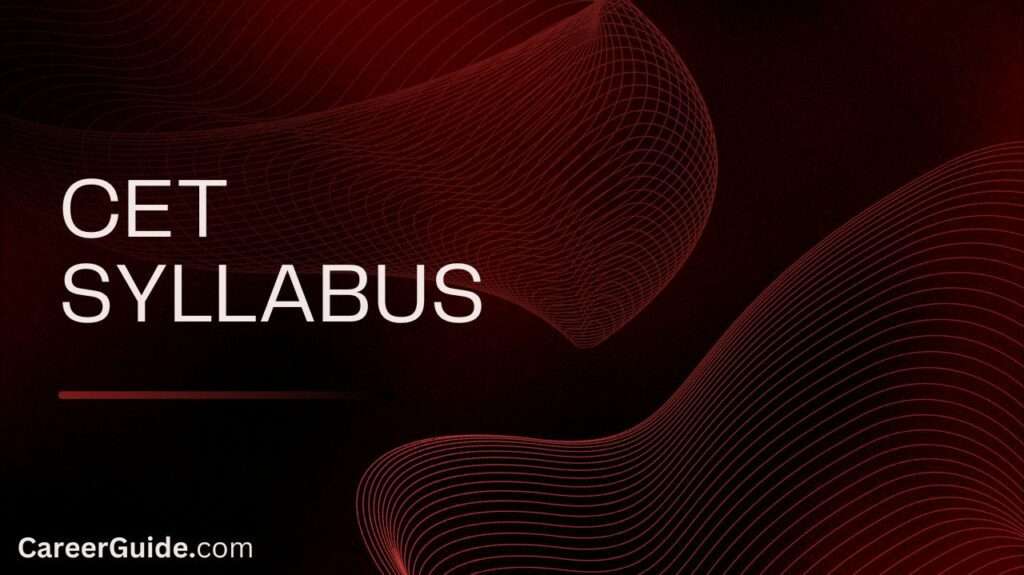CET Syllabus: CET, or Common Entrance Test, is a term used for various entrance exams in India that are conducted for admissions into undergraduate and postgraduate programs in various fields such as engineering, medical, management, law, and more.
Since CET syllabi can vary significantly depending on the specific exam and field of study

CET Overview
CET, or Common Entrance Test, is a standardized examination conducted in India for admissions into various professional undergraduate and postgraduate programs. These exams are typically conducted at the state or national level and serve as a common platform for students to compete for limited seats in prestigious institutions. CETs are known for their competitive nature, and they play a significant role in shaping the academic and professional careers of millions of students.
Common Subjects in CET Syllabus
While the specific subjects and syllabi can vary widely across different CET exams, there are some common subjects that are frequently tested in various CETs:
Mathematics: This subject typically includes topics like algebra, calculus, geometry, trigonometry, and statistics. It is a common component in engineering, management, and some medical entrance exams.
Physics: Physics questions may cover mechanics, electromagnetism, optics, and modern physics. This subject is prominent in engineering and medical entrance exams.
Chemistry: Chemistry topics include organic chemistry, inorganic chemistry, physical chemistry, and analytical chemistry. Chemistry is often part of engineering and medical entrance exams.
Biology: Biology is a crucial subject in medical entrance exams, including topics like zoology and botany.
Verbal Ability: Verbal ability or language proficiency is tested in management, law, and some other professional exams. It may include reading comprehension, grammar, vocabulary, and writing skills.
Logical Reasoning: Logical reasoning and critical thinking are tested in management, law, and other exams. Questions may involve puzzles, analytical reasoning, and decision-making.
General Knowledge/Current Affairs: General knowledge and current affairs are often part of management, law, and some other exams. They may include questions on current events, history, geography, and more.
Popular CET Examinations
Let’s explore some of the popular CET examinations across different fields:
a. CET for Engineering
JEE (Joint Entrance Examination) Main: JEE Main is one of the most competitive engineering entrance exams in India. It’s the gateway to top engineering colleges, including the Indian Institutes of Technology (IITs).
State CETs: Various states conduct their own Common Entrance Tests for engineering admissions. Examples include Maharashtra CET (MHT-CET), Karnataka CET (KCET), and Andhra Pradesh Engineering, Agriculture, and Medical Common Entrance Test (AP EAMCET).
b. CET for Medical
NEET (National Eligibility cum Entrance Test): NEET is the primary medical entrance exam in India for admission to undergraduate medical and dental programs. It’s conducted at the national level.
AIIMS (All India Institute of Medical Sciences): AIIMS conducts its own entrance exam for admissions into MBBS programs.
c. CET for Management
CAT (Common Admission Test): CAT is the most widely recognized entrance exam for admission to postgraduate management programs, including those at the Indian Institutes of Management (IIMs).
MAT (Management Aptitude Test): MAT is a national-level entrance exam for admission to various management programs.
XAT (Xavier Aptitude Test): XAT is conducted by XLRI on behalf of Xavier Association of Management Institutes (XAMI) for admission into management programs.
d. CET for Law
CLAT (Common Law Admission Test): CLAT is a common entrance test for admission to undergraduate and postgraduate law programs at various national law universities.
AILET (All India Law Entrance Test): AILET is conducted by National Law University, Delhi, for admissions to its law programs.
e. CET for Other Fields
NIFT (National Institute of Fashion Technology): NIFT conducts its entrance exam for admissions into fashion and design programs.
NCHM JEE (National Council for Hotel Management and Catering Technology Joint Entrance Examination): This exam is for admissions into hotel management and hospitality programs.
GATE (Graduate Aptitude Test in Engineering): GATE is an examination for postgraduate admissions in engineering, technology, and related fields.
Preparation Strategies
Preparation for CET exams requires a structured approach. Here are some general preparation strategies that apply to most CETs:
Understand the Syllabus: Familiarize yourself with the official syllabus for the specific CET you are preparing for.
Create a Study Plan: Develop a well-organized study plan that allocates sufficient time to cover each subject or section.
Use Quality Study Material: Choose reputable books and study materials. You may also find online resources, test series, and coaching programs helpful.
Practice Regularly: Regular practice is crucial. Solve previous years’ question papers and take mock tests to improve time management and accuracy.
Time Management: Practice time management during the exam. Allocate specific time to each section, and don’t spend too long on one question.
Stay Informed: For exams that include current affairs or general knowledge, read newspapers and stay updated with current events.
Healthy Lifestyle: Maintain a healthy lifestyle with a balanced diet, exercise, and adequate rest.
Stay Positive: Believe in yourself and stay positive. Confidence is a key factor in succeeding in competitive exams.
Frequently Asked Questions
A CET is a standardized entrance examination conducted for admissions into various undergraduate and postgraduate programs in India. CETs are field-specific and vary depending on the program, such as engineering, medical, management, law, and more.
CETs are not the same; they vary by the field of study. Each CET has a specific syllabus tailored to the subjects and skills relevant to that field. For example, the syllabus for a medical CET will differ from that of an engineering CET.
Common subjects in CET syllabi include Mathematics, Physics, Chemistry, Biology, Verbal Ability, Logical Reasoning, General Knowledge, and Current Affairs. The specific subjects tested depend on the CET and the program it covers.
You can find the syllabus for a specific CET exam on the official website of the exam conducting authority. They typically provide detailed information on the subjects, topics, and subtopics to be covered.
CET syllabi can undergo changes or revisions, although these changes tend to be gradual. It’s essential to stay updated with the latest syllabus by regularly checking the official website or official notifications from the exam conducting authority.







